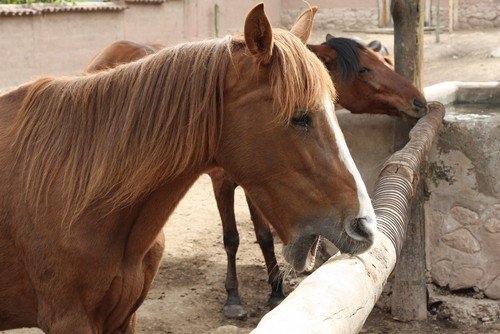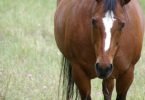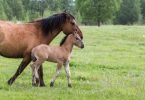Horses, just like any other animal, display a set of behavioral patterns. One of the most discussed behavioral patterns of horses has to be horse cribbing. While many understand it, many don’t. However, if you are a horse owner, then it’s one of those behaviors that you need to be aware of.
To know more about different behavior problems in horses, click this article “Most Common Behavior Problems in Horses“.
What does horse cribbing mean?
There may have been instances when you have spotted your horse grasping horizontal objects with its mouth. You may have ignored it, thinking that it is one of those crazy animal behaviors that you might not understand. However, what your horse is doing is much more than just grasping something.
Using its incisor teeth to grasp the object with its neck arched. Its lower neck muscles contract, it retracts its larynx. What follows is a considerable amount of air that enters its esophagus, causing a grunting sound. Cribbing is the term that describes this sound.
So, if you have seen your horse biting on something and grunting while doing it, click here to know what you have to do to put a stop to it. If you want to know more about the whys of horse cribbing, then read on.
What are the Reasons for Horse Cribbing?
There are a few factors that may determine how frequently your horse cribs. Studies are still on-going as to how these factors get directly linked to the cribbing habit. However, certain studies have linked horse cribbing to the following possible reasons:
Dietary Changes
If your horse has been on a particular diet for a long time, and you suddenly switch it up? It may affect your horse’s cribbing habit. Experts have claimed that horses whose primary food is sweet feet show more instances of cribbing than horses that are primarily oat-eaters.
Anxiety
Chronic anxiety and stress are things that can have long-lasting effects not just on humans, but on horses as well. It has been well-established that horses that have anxious and nervous personalities tend to crib more. Instances of cribbing are much fewer amongst cold-blooded horses that know how to keep their calm.
Breed
What breed is your horse? If it’s a thoroughbred, then it’s not much of a surprise if it is a cribber. Statistics suggest approximately 8% of the thoroughbred population is prone to developing a habit for cribbing. It is something entirely genetic. Quarter horses also display cribbing habits.
Hyperacidity and Other Stomach Issues
Hyperacidity is another issue that may trigger a cribbing habit. Chronic hyperacidity can lead to the formation of gastric ulcers that can unsettle horses and significantly increase their stress levels, leading to cribbing.
Boredom
Horses, which are in its stall for a long time, are bored out of its mind. With nothing to do while they are awake, some horses may adopt strange behavioral patterns to keep themselves from getting bored, and cribbing is one of them.
Isolation
Horses are social beings. We might not be able to hear them talk, but they do like to communicate with their kind. Often, owners of single horses tend to keep their horses confined to their stables, completely alone and isolated. It is quite a damaging effect on the horse’s social needs, as a result of which it may develop a cribbing habit.
Endorphins
Several studies have suggested that horses that have a cribbing habit may be seeking a “high.” These studies state that most horses crib to keep themselves mentally stimulated. This mental stimulation may result in the release of feel-good chemicals known as endorphins in the horse’s brain. When the horse associates cribbing with the feel-good factor triggered by the release of endorphins, it may begin to crib more to feel good more frequently.
How to Identify the Signs of a Cribbing Horse?
Sure signs serve as indicators to tell you whether or not your horse cribs. Hearing your horse grunt very often is a tell-tale indicator. Still, you can’t devote your entire day to listening for horse cribbing sounds. Here are a few signs that you need to look out for to tell whether your horse is cribbing or not:
Gnaw Marks on Fence Posts and Stall Doors
Check if there are prominent gnaw marks on fence posts and stall doors. While a few marks are no immediate causes for concern, a lot of them may indicate a horse that cribs a lot.
Worn out Incisor Teeth
If your horse is friendly with you and doesn’t mind you taking a look at its teeth, then you should pay frequent attention to find out the condition of its incisor teeth. If it looks worn out compared to how old your horse is, then it’s a surefire sign of that your horse has developed a cribbing habit.
Frequent Neck Arches
You may not always be able to hear the horse cribbing sound from afar, but if you are in the vicinity, then try and keep an eye out for your horse’s behavior. If you spot it arching its neck frequently and seemingly biting on something, then it just might be a signal that your horse is cribbing.
How can cribbing Affect Your Horse?
Horse cribbing may have several adverse outcomes, particularly for your horse’s health. If you consider maintaining your horse’s health a priority, then you should be aware of these long-term consequences and take preventive measures accordingly.
Dental Damage
No matter how much you take care of your horse’s dental health, it will still be prone to significant dental damage if you can’t keep its cribbing habits in check. The incisor teeth that your horse uses while cribbing will gradually go on to lose their collective strength, making them chew food is a problematic affair. The damage may be severe in the short-term as well, notably as horses do not differentiate between metal objects and wooden objects. Cribbing horses frequently injure themselves as a result of their obsessive-compulsive cribbing habits.
Development of Eating Disorders
Horses that have developed a severe cribbing problem tend to show signs of eating disorders. Such is their dependence on cribbing that many of them may refuse to eat and choose to crib instead. Lack of food over time may cause gas, bloating, and indigestion in the horse’s stomach, leading to more chances of ulcers and hence, an increased probability of cribbing.
Colic
Abdominal pain in horses is bound to increase as they keep refusing food and keep gnawing on objects instead. Horses will practically bite on anything if they develop a cribbing habit. They stand a significant risk of consuming bacteria. The bacteria may fester in their guts for some time and cause a whole host of colic issues.
Epiploic Foramen Entrapment
A particular type of colic, this condition can render horses extremely sick and is potentially fatal. The enormous amount of air that enters the horse during cribbing results in the small intestine becoming trapped inside an abdominal opening known as the epiploic foramen. As the small intestine gets trapped, the blood supply is affected, and the trapped part of the small intestine dies eventually. The only way to save the horse in this condition is to remove the trapped part from the intestine surgically.
The Great Myth Surrounding Horse Cribbing
Horse cribbing, in the most extreme cases, can have a lot of negative impact on your horse’s health and fitness. As more and more horse owners have started to share their experiences of horse cribbing online and how they have resolved them, a lot of myths have also been shared.
One of the greatest myths surrounding horse cribbing is that horses learn to crib from their peers. As horses are typically trained in groups and are also kept together in the stables, they indeed witness a whole host of behaviors displayed by the other horses in their company.
However, scientifically speaking, there is no proof to suggest that merely witnessing the habit of cribbing in another horse acts as a catalyst for a particular horse to start cribbing. It is a myth. It has been so widely shared online that many horse owners believed it and kept their horses in isolation in fear of them developing a cribbing habit.
Remember, horses are living beings with just as much emotional sensitivity, if not more than humans. If you leave your horse isolated, it is sure to grow bored, lonely, and in time, severely depressed. That, in turn, may give rise to increased instances of cribbing.
Horse Cribbing Statistics
Statistical studies surrounding cribbing horses have revealed many statistics regarding horses that exhibit cribbing habits. A 2009 survey in the US showed that approximately 5% of all horses in the country have cribbing tendencies.
In Canada and Europe, 3 – 8% of the horse population showed cribbing habits. Thoroughbreds showed the highest percentage of cribbing tendencies, and in the ones used as racehorses, the tendencies are even higher. It has revealed a need for improving conditions in the animal husbandry and welfare sectors.






